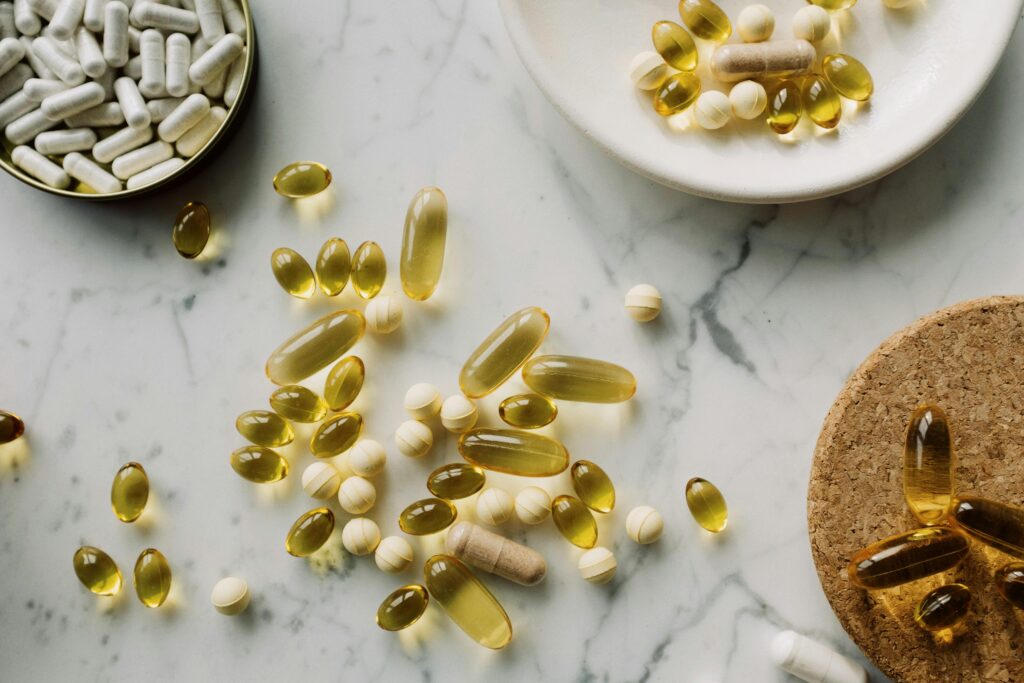Interested in working with a dietitian?
call
Women's Health Dietitian & Nutritionist fuelled by coffee. My mission is to empower you confidently nourish your body without stress or restrictive diets
Hello, I'm Madi!

Trying to get pregnant in your 30s can feel like a rollercoaster. You’re probably looking for anything that might help, and that often leads you to the world of fertility supplements. The internet is full of advice on everything from prenatal vitamins to exotic herbs, but it’s tough to know what’s real and what’s just hype.
As an accredited practising dietitian, I understand how confusing and emotional this journey can be. That’s why we’re going to break down the top 5 supplements people talk about for women over 30 who are trying to conceive (TTC). We’ll separate the science-backed solutions from the wishful thinking, so you can feel confident about what you’re putting into your body.
A quick heads-up: Always chat with your doctor before starting any new supplement. What works for one person might not be right for another.
1. Prenatal Vitamins: The Absolute Must- Have
If you only take one supplement, make it a prenatal multivitamin. Think of it as the foundation for your fertility journey. While it’s not a magic pill that instantly makes you pregnant, a good prenatal provides key nutrients that are vital for both your reproductive health and a healthy baby from the very start.
The most important ingredient is folate. It’s proven to prevent serious birth defects in a baby’s brain and spine. Doctors recommend taking it for at least 1-3 months before you even conceive. Beyond preventing defects, studies show that women who take a multivitamin with folic acid have a lower risk of not ovulating. That’s a big deal!
- Pros: It’s a complete package that fills nutritional gaps, supports your hormones, and lays the groundwork for a healthy pregnancy.
- Cons: It’s not a quick fix for infertility and some people can experience mild nausea or constipation from the iron.
2. Omega-3 Fatty Acids: For Inflammation and Egg Quality
You’ve probably heard about the benefits of Omega-3s for heart and brain health, but they are also a powerhouse for fertility. Omega-3 fatty acids, specifically EPA and DHA, are healthy fats that help reduce inflammation throughout the body.
Why does that matter for getting pregnant? Chronic inflammation can disrupt your hormones and make it harder to conceive. By lowering it, Omega-3s create a better environment for conception. They also improve blood flow to your reproductive organs and have been shown to support egg quality and delay ovarian aging. For couples doing IVF, a higher intake of Omega-3s has been linked to better pregnancy and live birth rates.
- Pros: Supports egg quality and embryo implantation, helps regulate hormones, and reduces inflammation that can hinder fertility.
- Cons: Not all supplements are created equal — choose a high-quality, third-party tested product to avoid contaminants like mercury.
3. Vitamin D: The “Sunshine” Vitamin
You might be surprised to see this on a fertility list, but Vitamin D acts more like a hormone in your body. It plays a big role in ovarian function and hormone production. Many of us are low in vitamin D, especially in our 30s.
Why does it matter for fertility? Research shows that women with enough vitamin D in their blood have a higher chance of a successful pregnancy, especially with fertility treatments like IVF. It’s also thought to help with conditions like PCOS and endometriosis, which are common causes of infertility.
- Pros: It may improve your chances with IVF and supports your hormones and ovaries.
- Cons: The research is still growing, so it’s not a guarantee. It’s best to get your levels checked by a doctor first, as too much can be harmful.
4. Co Enzyme Q10: For Egg Quality
As we get older, our egg cells need more energy to mature and divide properly. Our body’s natural levels of Coenzyme Q10 (CoQ10), a powerful antioxidant, start to drop with age. This is where a supplement comes in.
CoQ10 can help “recharge” the energy in your eggs and protect them from damage. Studies have found that women who take CoQ10 before an IVF cycle often produce more high-quality embryos. It’s not a miracle cure, but many fertility specialists recommend it, especially for women over 35.
- Pros: It may improve egg quality and embryo development, which can boost your chances, especially if you’re undergoing fertility treatments.
- Cons: It can be expensive, and you need to take a fairly high dose for it to be effective. The evidence is still relatively new and not conclusive for everyone.
5. Myo-Inositol: A consideration for PCOS
If you have PCOS or a history of irregular cycles, Myo-Inositol might be a game-changer. This supplement helps your body respond better to insulin, which in turn helps balance your hormones and gets your ovulation back on track.
For women with PCOS, studies show that taking myo-inositol can lead to more regular periods and an increase in ovulation. It’s also been linked to improved egg quality in women with insulin resistance. It’s gentle, safe, and found in foods like beans and grains.
- Pros: It’s one of the most effective supplements for PCOS-related infertility, helping to restore ovulation and improve egg quality.
- Cons: It’s not a one-size-fits-all solution; it’s most helpful for women with specific hormonal imbalances. You also need to be patient, it can take a few months to see results.
Bonus (6). N-acetyl-cysteine (NAC): The Antioxidant Powerhouse
You may have heard of N-acetyl-cysteine (NAC) as a supplement for respiratory health, but it’s gaining attention for its fertility benefits. NAC is an antioxidant that helps the body produce a powerful compound called glutathione. This can help reduce oxidative stress, a condition where too many “free radicals” can harm your reproductive cells.
Research shows that NAC can be particularly helpful for women with PCOS. Studies have found that when taken with the fertility drug Clomid, NAC can improve ovulation rates and increase the number of pregnancies. It’s also been shown to help with insulin resistance and reduce inflammation in women with PCOS. Because of its antioxidant properties, some people also use it to try and improve egg quality, although more research is needed on that specific benefit.
- Pros: It’s effective for improving ovulation and pregnancy rates in women with PCOS, especially when used with fertility drugs. It’s also a powerful antioxidant that can improve overall reproductive health.
- Cons: The main benefit is for women with PCOS-related infertility, so it may not be useful for others. It can also cause mild side effects like nausea or digestive upset.
Final Thoughts: Balancing Hope with Evidence
Trying to conceive can be emotionally and physically draining. It’s easy to feel overwhelmed and want to try everything. The goal here isn’t to take away hope, but to give you clarity. Focus your energy on supplements with solid scientific backing, like a quality prenatal, and be cautious about the others that promise miracles.
Remember, supplements are just one part of a bigger picture. They work best alongside a healthy diet, regular exercise, and good sleep. And most importantly, you are not a statistic. You are a person with a unique story. Be kind to yourself, educate yourself, and know that you’re doing your best to prepare for a healthy baby.
Ready to create a plan just for you?
This blog post gives you the facts, but your body is unique. The best way to use this information is to create a personalised plan.
If you’re ready to stop guessing and start a supplement routine that’s designed for your specific needs, let’s talk.
Book a Free 15-Minute Call to Discuss Your Supplement Plan
